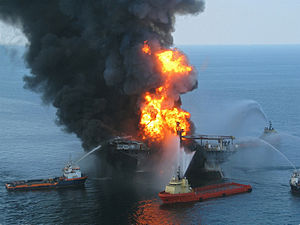BP blowout was not environmental disaster
 Image via Wikipedia
Image via Wikipedia“There’s just no data to suggest this is an environmental disaster,” said marine scientist and former Louisiana State University professor Ivor van Heerden, who also works as a BP spill-response contractor. “I have no interest in making BP look good - I think they lied about the size of the spill - but we’re not seeing catastrophic impacts. There’s a lot of hype, but no evidence to justify it.”There is much more.
These observations came not a year after the Deepwater Horizon blew up, but a mere three months afterward, making them all the more blasphemous at the time. By now they’ve been amply vindicated, making the Obama team’s “moratorium” and more recent stonewalling on Gulf of Mexico drilling permits all the more preposterous.
I grew up in southern Louisiana and spend most weekends along the Louisiana coast hooking, spearing, gaffing, blasting and otherwise assassinating the raw ingredients of family meals. So I have more than a casual concern with the BP oil spill.
The reasons this “disaster” fizzled out are many and were apparent to non-hack scientists from the get-go.
“People don’t comprehend how so much oil could break down in such a short time period,” explains LuAnn White, a toxicologist with the Tulane University School of Public Health and Tropical Medicine who also serves as director of the Center for Applied Environmental Health. “But we have natural oil seeps in the Gulf, and over 200 genera of microbes that break down oil already exist there.”
“It cannot be repeated often enough,” says Louisiana marine biologist Jerald Horst. Crude oil is a natural substance; it’s biodegradable. It’s a feast for microbes. And these consumed most of it from the BP spill.” The horrid black goo that leaked into the Gulf of Mexico from the BP spill last year is certainly toxic - but so are broccoli, beer and salt. It all depends on the dosage. In fact, that horrid black goo has spilled naturally into the Gulf for millenniums - at the rate of two Exxon Valdez spills annually.
A study by the Department of Oceanography at Texas A&M University found 600 “oil spills” into the Gulf, all ancient if not prehistoric, all antiseptically “natural” and all courtesy of earth goddess Gaia. In fact, these “spills” probably saved the survivors of Hernando De Soto’s plucky band of explorers, who record caulking their boats in 1542 with the abundant tar balls found along an eastern Texas beach. The study also reports that in 1909, a genuine gusher was spotted in the same area, shooting crude oil high into the air from the Gulf floor.
...
These finding make the refusal to grant more permits all the more inexplicable. The administration claims not to have amnesia about the spill, but it certainly has it about the long term effects of the spill. We need to turn loose the drillers and allow them to create the energy potential of the Gulf as well as thousands of jobs and millions in royalties for the government.

Comments
Post a Comment